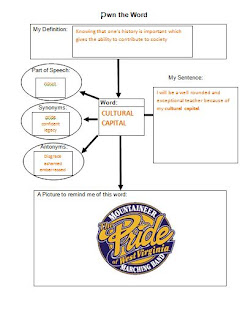Learning to read in elementary school is one of the most important things one should take before moving on to middle school. If you don't have a very good teacher, then that makes ALL the difference. Then, once you get to middle school and beyond, if you have difficulty reading, then that makes daily life pretty difficult. Every school year, students are tested; they are tested on many things. If a student can't read the test, or doesn't comprehend the questions being asked, that student could get a poor grade and this will alert the teacher to something being wrong. This is why reading test scores are important: so teachers can see that you are having difficulty, how much difficulty, and steps can be taken to help get you where you need to be.
Something I find a bit surprising is the myth about learning to read and write only occurring in elementary school. I suppose, after reading this article, I realized that you just get the basis for reading and writing in elementary school. As you progress through school, and life, you learn so much more. Reading and writing takes continued usage and practice to improve and develop a better sense of literacy. Something to help students with literacy and comprehension is to ask questions as you go along, or, one of my favorite ideas, is to group students and have them dramatize what they just read. This works with comprehension because some students didn't fully comprehend what they read, but working with classmates to act out what they just read helps it stick in their memory and it's an engaging experience.
A discourse community is basically a group of people with a common interest or goal that has their own "-isms" that just this little community understands. Many discourse communities are outside of the school setting and this is where literacies that you don't learn in school are adapted. For example, I belong to a discourse community of people who have sugar gliders. We speak our own language that only a few of my friends who do not have sugar gliders understand because I have tried to educate them so they have some literacy on these small marsupials. Literacy practice, in this instance, would be when I am in a sugar glider chat room and we are discussing diet. I am literate on different diets that are good for gliders, so when someone asks "What should I feed my sugar glider", I can answer "suggie soup, HPW, BML and VGV are some of the most popular diets that offer the most benefits for your glider's health". Obviously, I love sugar gliders and it is quite offensive when someone dismisses this love as petty or unimportant. I would be devastated if I were a small child with this love and the literacy I have about gliders, and my teacher dismissed it as unimportant or invaluable. This would interfere me with learning and my relationship with my teacher would be strained because I would feel like my interests and things I have a plethora of knowledge about outside of school are unimportant. On the other hand, if a teacher told me that my knowledge about sugar gliders is fascinating and it would be a great way to highlight a lesson she would be teaching on marsupials or nocturnal animals, I would feel that my knowledge on these animals is valued, important, and I would feel extra special. Other, smaller ways, teachers can build on these extracurricular literacies of their students is to do a show-and-tell or a free write.
This reminds me of my fifth grade teacher, Mrs. Freeman. She was an incredible motivator. One kid in class who I will call Fred, was that kid will all kinds of energy that all the teachers screamed "NOO" on the inside when they found out he was going to be in their class for the school year. Fred was hyperactive (he had ADHD) and tended to be defiant to teachers as well. Mrs. Freeman had patience with Fred, she joked with him and allowed him to be free to be himself in class, within reason. She never scolded him in front of the class, and if he got in trouble, she would sneer at him and threaten something completely outrageous to him. While this might seem a bit much, it worked for Fred. He looked forward to going to school in fifth grade, where he hated school in previous years. She was one of the only teachers that he would go out of the way to help or do something nice for. I even talked to Fred the other day who told me "Mrs. Freeman was my favorite teacher. She was cool with me as a person, she didn't put me down in front of the class (which was a trigger for defiant behavior) and she joked around with me". THIS is how Mrs. Freeman motivated Fred to be the best he could be. He actually did his homework for her, raised his hand to answer questions in class, and he was respectful in class. Because of Fred and Mrs. Freeman, I am motivated to be the kind of teacher that she is. I have told her this, too. I want to be the kind of teacher that students look up to and respect, yet know I respect them for their individual literacies and personalities.
Bolima , D. (n.d.). Contexts for understanding: Educational learning theories. Retrieved from http://staff.washington.edu/saki/strategies/101/new_page_5.htm
The National Counsel of Teachers of English. (2007). Adolescent literacy. Retrieved from http://www.ncte.org/library/NCTEFiles/Resources/Positions/Chron0907ResearchBrief.pdf


